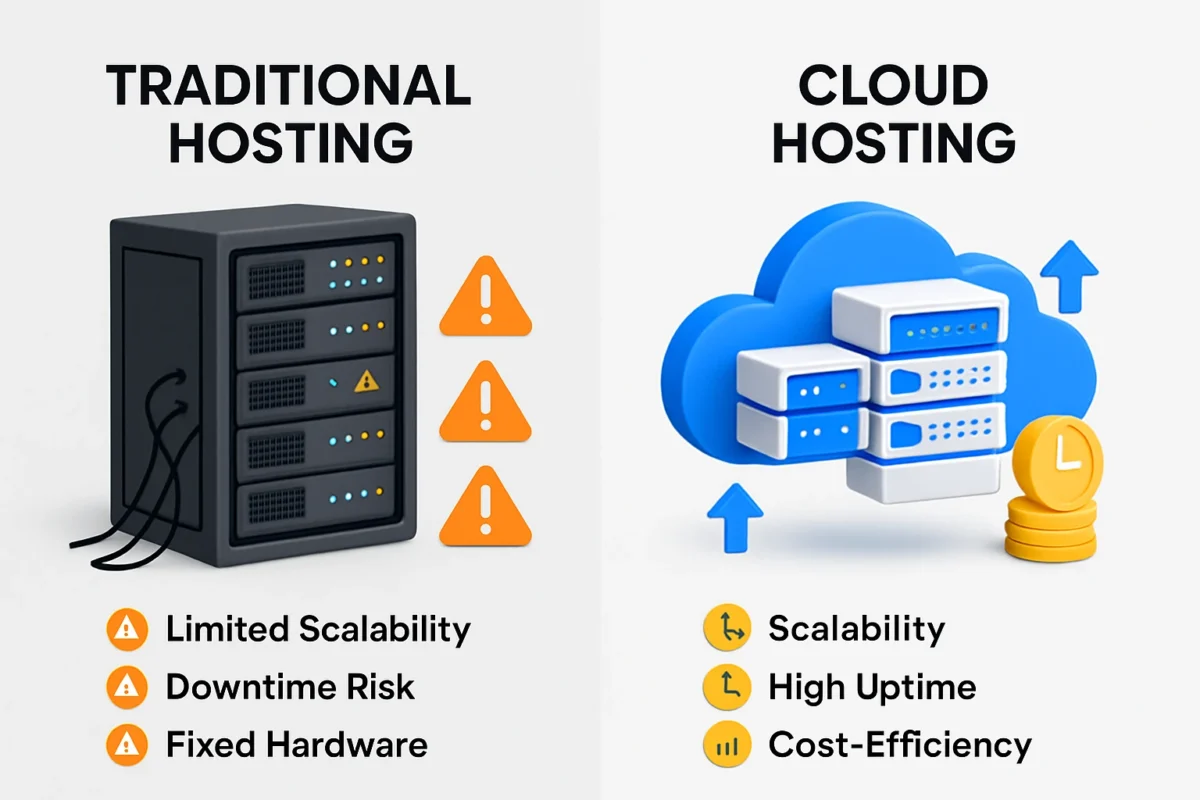In today’s digital-first world, hosting infrastructure is crucial to a business’s scalability, performance, and reliability. While traditional hosting methods like shared or dedicated hosting were once standard choices, the shift towards cloud hosting reshapes how businesses manage their online operations.
This article explores how cloud hosting outperforms traditional hosting models, especially in the context of the Indian hosting ecosystem, where providers like Hostzop Cloud Services Pvt. Ltd. are helping businesses move forward with reliable and cost-effective infrastructure.
1. Scalability and Flexibility

Traditional Hosting
With shared or dedicated servers, you’re bound to fixed hardware limits. Upgrading resources typically requires downtime and manual migration.
Cloud Hosting
Cloud platforms offer on-demand scalability. Need more CPU, RAM, or storage? It can be provisioned within minutes—no service interruptions. This flexibility is particularly beneficial for businesses with fluctuating traffic.
Providers like Hostzop offer compute-optimized and memory-optimized cloud instances, letting businesses tailor resources without overpaying.
2. Reliability and Redundancy
Traditional Hosting
If a physical server fails, your website/application may go offline until it is fixed. The lack of redundancy increases the risk of prolonged downtime.
Cloud Hosting
Cloud environments are built on distributed networks. If one server fails, another automatically takes over, ensuring uptime and service continuity.
Hostzop, for instance, hosts its cloud infrastructure in AdaniConnex Chennai Datacenter, offering enterprise-grade redundancy with proactive monitoring.
3. Cost Efficiency
Traditional Hosting
You often pay for fixed hardware—even when you’re not utilizing full capacity. Scaling up usually involves purchasing or leasing additional hardware.
Cloud Hosting
Cloud hosting follows a pay-as-you-go or custom billing model. You pay for the resources you use, making it a cost-effective solution for startups, SMEs, and seasonal businesses.
Many Indian businesses choose Hostzop for its transparent pricing and flexible billing options, compared to rigid legacy hosting plans.
4. Performance Optimization
Traditional Hosting
Performance depends on the physical server’s specs and how other users are consuming resources in the case of shared hosting.
Cloud Hosting
Cloud servers are isolated and can leverage load balancing, auto-scaling, and content delivery networks (CDNs) for faster load times and optimized performance globally.
Hostzop leverages SSD-based cloud storage, low-latency networks, and intelligent routing to ensure performance isn’t compromised—even during peak load.
5. Disaster Recovery & Data Backup
Traditional Hosting
Data backups are often manual or scheduled, and disaster recovery may involve significant downtime and recovery delays.
Cloud Hosting
Most cloud providers offer automated backup, snapshot recovery, and geographic replication, which minimizes data loss during outages.
Hostzop includes automated backup solutions with optional multi-zone redundancy for enhanced data protection.
6. Security Measures
Traditional Hosting
Security is limited to basic firewalls and software protection. Dedicated server users often need to manage their security configurations.
Cloud Hosting
Advanced DDoS protection, firewalls, encryption at rest & transit, and regular security patches come standard with most cloud platforms.
Hostzop takes a proactive security approach—offering built-in firewalls, 24/7 monitoring, and customizable security rules for compliance-driven industries.
7. Ease of Management & Automation
Traditional Hosting
Server management involves manual configurations, updates, and troubleshooting. It requires skilled sysadmins.
Cloud Hosting
Modern cloud platforms support automation tools, control panels, APIs, and auto-healing capabilities that simplify server operations.
With Hostzop’s user-friendly dashboard and managed cloud services, non-technical users can easily manage workloads.
8. Environmental Sustainability
Traditional Hosting
Running dedicated hardware 24/7 can lead to inefficient energy use, especially when servers are underutilized.
Cloud Hosting
Cloud environments optimize energy usage by efficiently allocating resources, often hosted in green-certified datacenters.
Hostzop’s Chennai-based infrastructure promotes energy-efficient server utilization, contributing to a more sustainable digital environment.
Conclusion: Why the Shift Toward Cloud Hosting Makes Sense
As businesses in India and worldwide grow more digital, their hosting needs demand agility, resilience, and performance—all hallmarks of cloud hosting. Traditional hosting models still have relevance for some use cases, but the future lies in the cloud.
Companies like Hostzop Cloud Services Pvt. Ltd. are at the forefront of this transformation in India, offering cloud solutions that are both reliable and tailored for business growth.
Whether running an eCommerce store, SaaS platform, or enterprise application, cloud hosting delivers a competitive edge that traditional hosting can no longer match.







